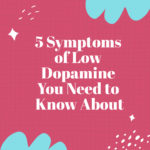
Dopamine is responsible for so many functions in the body, that calling it the "feel good" neurotransmitter really doesn't do it justice.
Dopamine has 4 major pathways (mesocortical, mesolimbic, nigrostriatal, and tuberoinfundibular) and they all do slightly different yet very important things in the body.
The mesocortical pathway primarily goes to the PFC (prefrontal cortex) . The PFC is responsible for cognitive processing to perform executive functions (planning, self-control, organization, working-memory, adaptable thinking, time management).
The mesolimbic pathway goes to the limbic structures (nucleus accumbens, amygdala, & hippocampus) and also to the PFC to engage the Reward System. The limbic structures are responsible for our immediate reactions, fears, and emotions. The Reward system main purpose is to reinforce behavior (behavior doesn't have to be pleasurable).
The mesolimbic & mesocortical pathways together are what helps us have focus, motivation, and avoid procrastination. These are the typical symptoms associated with low dopamine that get discussed and diagnosed frequently (ADHD, anxiety, depression, schizophrenia, psychosis).
But the other two pathways are just as important for a well functioning body.
The nigrostriatal pathway is responsible for voluntary movement. Initiating and controlling movement all starts with this dopamine pathway.
The tuberoinfundibular pathway goes to the pituitary. The pituitary gland does a lot and it's often called the "master gland". It regulates most of the hormones and endocrine system including growth hormone, prolactin, thyroid stimulating hormone, and the release of all of the sexual hormones (estrogen, progesterone, and testosterone). The pituitary also helps with stress response, blood pressure, and fluid balance.
Because of the diverse functions that dopamine is responsible for initiating, low dopamine can cause a variety of problems that get overlooked until there is a big problem.
There is no one definitive way to test dopamine levels. Dopamine resides in the brain and does not cross the blood brain barrier so the only way to get a reading of the levels is to go into spinal fluid. And even if you do that, it only tests the current levels of dopamine not the ability of the brain to produce dopamine.
The most important thing you can do is to be aware of the symptoms of low dopamine, especially the overlooked symptoms.
When it comes to dopamine levels, many people are unaware if they have low dopamine. This lack of knowledge can often lead to problems down the road. Here are seven symptoms of low dopamine that you need to be aware of:
Since dopamine helps the body regulate blood pressure, people with low dopamine often have low blood pressure. The most common symptom of low blood pressure is frequently getting dizzy. This gets overlooked because many people get slightly nervous at the doctor's office. When you get nervous it raises your blood pressure. If you have low blood pressure and you are nervous, your blood pressure will look normal.
If you've ever dropped something that you were holding on to and you didn't mean to, that is due to an interruption in your voluntary movements. Dopamine regulates voluntary movement. Sadly, doctors don't often ask their patients if they're clumsy and it doesn't get noticed until they start developing Parkinson's disease.
Whether you can control your bladder like a camel or feel like you have to pee more frequently or have incontinence problems, low dopamine is often the root cause. If you could hold your pee like nobody's business when you were younger but then developed hyper bladder activity, that's an overlooked symptom of low dopamine. It's a little more complicated than what can easily be described in a paragraph but it involves both the nigrostriatal and tuberoinfundibular pathways.
If you're consuming sufficient magnesium and potassium yet find yourself cramping up (or having restless leg syndrome), it's probably low dopamine causing it. Frequent muscle cramps that get worse and worse (dystonia) are the beginning signs of Parkinson's.
Dopamine is directly tied to stress and the production of the reproductive hormones. If you were getting chased by a tiger (aka stress) you shouldn't be thinking about having sex. Most of us are crazy stressed. Stress impacts your levels of dopamine. When you have low dopamine, you will produce less of the reproductive hormones that will make you want to get it on. So yes, your low libido is because of your hormones... but your hormone imbalance is most likely tied to low dopamine!
Want to know how to increase your dopamine levels naturally? Check out my "Biohack Your ADHD Naturally" masterclass. As you just learned, you don't have to have ADHD to have low dopamine but if you have ADHD you do have low dopamine levels. So most things that will help people with ADHD will help people with other low dopamine issues.